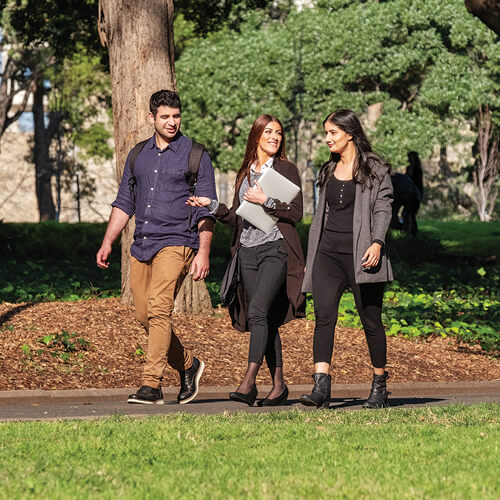Are you an International student? Check out the information hub at the link below.
Studying in Australia as an international student is an exciting time filled with many new experiences. It can also be nerve-wracking to navigate a new country, a new campus, and make new friends.
Today, we’re giving our best advice for international students to help you settle into life in Australia as smoothly as possible. From attending ACAP student events and exploring your local area to learning some basic Aussie slang, we’ll cover it all below!
1. Enhance Your English Skills
While Australia is a very multicultural country with a diverse range of citizens, the primary language spoken here is English. If English isn’t your first language, you may find it challenging to integrate into Australian life.
But don’t worry — help is available! Check out ACAP’s English language support videos to help strengthen your reading, writing, speaking, and listening skills, and increase your confidence in communicating with locals.
2. Become Familiar With Social Customs
Familiarising yourself with social customs can help you to feel a part of your community. These social customs include:
Dress Codes
- In Australia, there are no laws on particular types of clothing — you can wear whatever makes you feel most comfortable, whether that’s a pair of thongs (flip-flops) and boardshorts (typical beachwear here in Australia), or your national dress from your home country.
- Workplaces will generally have some form of required dress code. This could range from a specific uniform to a suit and tie; however, many workplaces allow neat and tidy ‘business casual’ to be worn.

Common Greetings and Slang
- When meeting people for the first time, it’s common to shake the person’s right hand with your right hand. People generally do not kiss or hug when meeting for the first time, however this is accepted once you’re familiar with one another.
- Australians are known for their slang phrases. It’s not uncommon to be greeted with a ‘G’day’ (short for ‘good day’), to be called ‘mate’ (even by a stranger!), or to hear ‘cheers’ instead of ‘thank you’ or ‘no worries’ in place of ‘you’re welcome’.
- Many Australians also have a habit of adding the letter O to the end of words, including ‘arvo’ for afternoon, ‘bottle-o’ for bottle shop/liquor store, and ‘servo’ for service station/petrol station.
- In the workplace and among friends, most Australians tend to be informal and call each other by their first names or even a nickname.
General Etiquette
- Polite manners are expected in Australia. ‘Please’ and ‘thank you’ are used when asking for or receiving something, while ‘excuse me’ or ‘pardon me’ are used to approach someone, get their attention, or to apologise.
- During conversation, it’s considered respectful to look the speaker in their eyes as this indicates you are listening to them.
- You should try to always be on time for meetings or other visits. If you are going to be late, you should contact the person to let them know.
- Australians will use a tissue to blow their nose. Spitting also needs to be done into a tissue and not onto the foot path.
- Many people will say ‘bless you’ when you sneeze. This has no religious intent.
- Tipping additional money for services is not expected in Australia, and tax (called GST) is included in the price of most products.
3. Explore Your Local Area
When it comes to studying in Australia, the quickest way to feel comfortable in your area is to play tourist for a day and visit nearby attractions. This will help you to learn your way around the community and familiarise yourself with public transport routes.
Consider checking out local cafes and restaurants, parks, museums, shopping centres, and major attractions that are well-known in your city.

4. Put Yourself Out There
While it can be daunting to socialise with strangers, it’s the quickest way to make new friends in your community. With Australia being as welcoming and multicultural as it is, you’ll likely encounter many others that are in the same position as you, having recently moved here to live, work, and study.
In addition to attending your ACAP Orientation Session and other on-campus events, securing a part-time or casual job is a great way to meet new people. On a student visa, you’re able to work up to 48 hours per fortnight during study periods.
Consider also joining local clubs or groups, including online groups that hold in-person meet-ups in your city, or going to workout classes at your closest gym.
5. Don’t Forget To Connect With Home
It’s normal to feel homesick from time to time, particularly in the early days of adjusting to your new surroundings.
To help ease this feeling, it’s important to make the time to regularly connect with your home country. This might be through phone or Zoom calls with loved ones, maintaining rituals that you completed back home, or enjoying familiar foods that you ate before moving to Australia.
With Australia being as welcoming and multicultural as it is, you’ll likely encounter many others that are in the same position as you, having recently moved here to live, work, and study.
6. Practise Self-Care
While you’re busy exploring your new community and socialising with newfound friends, remember to take time out for yourself and practise self-care.
This looks different for everybody — for some, it might be taking alone time to get a coffee and read each morning; for others, it could be playing a particular sport or game.
Whatever hobbies you enjoy, it’s important to continue to make time for them. This can help you maintain a sense of normalcy and routine at a time when it’s easy to become overwhelmed.
7. Ask For Help If You Need It
As a new student in Australia, you’ll likely have many questions arise as you begin to settle into your new life here. Fortunately, Australians are a friendly bunch and willing to provide advice — you just need to ask!
ACAP has a range of student support services available, including a Student Engagement Team on each campus, an online learning hub, counselling support, and an IT helpdesk. We’re here to support you through any challenges you might face, so please don’t hesitate to reach out for help should you need it.
Our Final Piece Of Advice For International Students
One of our most important tips for international students settling into Australia is to be patient.
While it’s only natural to want to settle into your new community quickly, it’s important to remember that moving to a new country can be a big adjustment and it’s okay for this process to take some time.
By following our advice for international students featured in this article, you’ll find your place in your new community sooner than you might think!
If you’re still deciding which course you’d like to study in Australia, explore some of ACAP’s most popular disciplines below.




